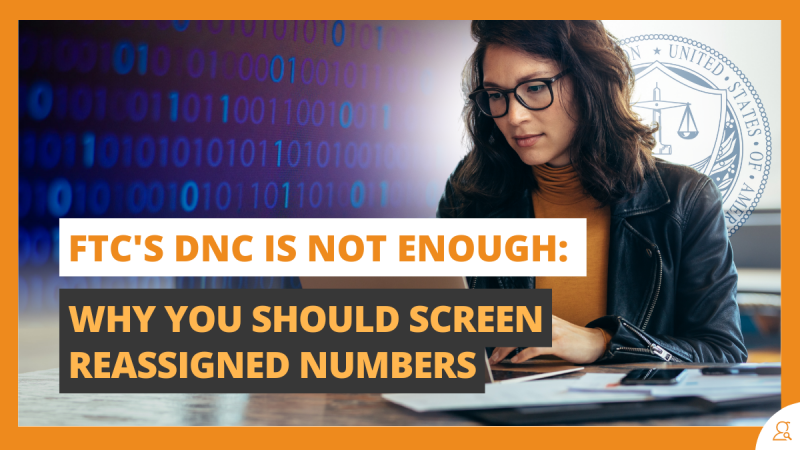18
FTC’s DNC is Not Enough: Why You Should Screen Reassigned Numbers
Telemarketing teams already know the Federal Trade Commission’s National Do Not Call (DNC) Registry is the first box to check before calling. Scrubbing against the DNC list reduces the risk of lawsuits and protects brand reputation. But what happens when a phone number gets reassigned?
A reassigned number is a phone number that no longer belongs to the original owner. Someone new has taken it over, and if your system still associates it with the old customer, you could end up contacting the wrong person. Courts have increasingly sided with consumers in these situations, even when companies argue the contact was unintentional.
That means the DNC Registry alone does not protect your business. Companies need an added layer of compliance to confirm whether a number has changed ownership. Without it, the cost of a single mistake could reach thousands of dollars per call or text.
Common TCPA Violations
The Telephone Consumer Protection Act (TCPA) sets the rules for telemarketing. Many businesses already know contacting numbers on the DNC Registry can trigger fines. But in recent years, another issue has become a leading cause of lawsuits—reassigned numbers.
Here are some of the most common TCPA violations:
- Calling numbers listed on the National and State DNC Registries
- Calling or texting without prior consent
- Using automated dialing systems to contact cell phones without consent
- Failing to honor opt-out requests
- Contacting reassigned numbers
Most companies often overlook that last item. Companies assume compliance is handled once they remove DNC numbers, but TCPA lawsuits increasingly show otherwise.
When a number is reassigned, the new owner never gave you consent. Even if you thought you were calling your customer, the law looks at who owns the number at the time of the call. This is where businesses run into costly mistakes.
7 Companies Involved in TCPA Cases Due to Reassigned Numbers Violations
Several companies across industries have faced lawsuits for contacting reassigned numbers. These cases highlight how serious the risk is, regardless of company size or intent.
1. Roark v. Credit One Bank (2018)
Credit One’s vendors placed 140 prerecorded calls to a number that had been reassigned to Stewart Roark. Once notified, the company stopped the calls immediately. The court sided with Credit One, ruling its system was not an autodialer under TCPA.
The case showed that quick corrective action can help limit liability, but it also highlighted the risks of calling numbers without checking reassignment.
2. Multiple Plaintiffs vs Wells Fargo (2019)
In total, between 2013 and 2019, Wells Fargo unintentionally dialed about 440,000 reassigned numbers with prerecorded debt-collection and alert calls. Consumers who had never given consent filed multiple suits, leading to a $17.85 million settlement. This case reinforced the scale of financial risk for businesses that fail to manage contact data and verify reassigned numbers.
3. N.L. v. Credit One Bank (2020)
Credit One again faced legal trouble after making 189 collection calls to a number now used by N.L. The bank had obtained consent from the original holder but not from the current subscriber. A jury awarded $94,500 in damages, rejecting the argument of good faith reliance on prior consent. The ruling confirmed that consent must come from the present owner of the number.
4. Fralish v. Ceteris Portfolio Services, LLC (2023)
Ceteris Portfolio Services placed calls to over 8,400 numbers that had already been flagged as reassigned or incorrect. The company settled for $761,850. The case demonstrated the steep costs of failing to validate numbers before launching automated campaigns.
5. Christine Head v. Citibank (2024)
Another notable case is Citibank, when they repeatedly called Christine Head, whose number had been reassigned from a former customer. With no relationship to the bank, she received debt-collection robocalls meant for someone else. Citibank settled for $29.5 million, one of the largest payouts linked to reassigned number issues. This case showed the financial consequences of relying on outdated records.
6. Stark v. Blue Cross and Blue Shield of North Carolina and Change Healthcare (2025)
Blue Cross NC and its vendor, Change Healthcare, continued making automated enrollment calls to Stark after she stated she was not their customer. A class-action lawsuit followed, covering more than 1,500 people, and the companies agreed to pay about $1.57 million. This outcome highlighted how ignoring reassignment warnings can escalate into expensive class-wide settlements.
7. Cornelius v. Deere Credit Services (2025)
Deere Credit Services made prerecorded servicing calls between 2020 and 2024 to numbers that had been reassigned. These were routine loan-related calls, yet they still triggered TCPA violations because the new owners had not consented. The company settled for $1.5 million. The case emphasized that reassignment checks are just as important for servicing as they are for sales or collections.
Why It is Important to Know if a Phone Number Has Been Reassigned
Every wrong number dialed has legal and business consequences. The new owner of a reassigned number may feel harassed if your business continues to contact them, and what looks like a small mistake to your team can quickly turn into a TCPA claim.
When a customer changes providers or cancels their service, the carrier recycles the old number and eventually reassign it to a new person. If your records are not updated, your system will keep calling the wrong individual. This creates several problems for telemarketing businesses:
- Compliance: Courts have made it clear that consent from the original customer does not transfer to the new owner. Once the number has been reassigned, any contact without fresh consent is a direct TCPA violation.
- Reputation: Repeated calls to someone who without consent reflect poorly on your company. Wrong numbers make your outreach look careless, and complaints can spread quickly online.
- Efficiency: Sales and support teams lose valuable time when they chase numbers that no longer belong to the intended customer. Each call to the wrong person reduces the time available to connect with real prospects or clients.
- Cost: TCPA penalties start at $500 per call or text and can rise to $1,500 if the violation is willful. A single campaign with outdated data could lead to thousands of violations, and several companies have paid millions in settlements as a result.
Reassigned number risks also extend beyond sales calls. Debt collection, account notifications, fraud alerts, and customer service reminders are all subject to TCPA rules. Whether the purpose of the call is promotional or operational, the liability is the same when the number no longer belongs to the person who gave consent.
Telemarketing companies that verify reassigned numbers protect their outreach, avoid wasted effort, and strengthen compliance. Adding this step ensures you only call the right customers and helps maintain a professional reputation.
Compliance Tool to Avoid Reassigned Numbers: RND API
The FCC launched the Reassigned Numbers Database (RND) to help businesses avoid these problems. It’s a centralized resource where carriers report when numbers have been permanently disconnected and reassigned.
Through the RND API, businesses can check if a number has changed ownership before making contact. The process is straightforward:
- Submit a phone number with the date you obtained consent.
- The API will return YES, NO, or NO_Data results based on the phone number status.
- Use the result to decide whether to proceed with the call or remove the number from your campaign.
This tool helps telemarketers avoid lawsuits, protect brand reputation, and keep calling lists accurate. Combined with a phone validator that checks DNC lists, litigators, and complainers, the RND API offers complete compliance coverage.
Why Choose Searchbug as Your Gateway to Reassigned Numbers Database?
- Free API Testing: Searchbug lets you test the RND API for free before committing. You can check speed, reliability, and integration without upfront costs—something the FCC does not provide.
- Quick Approval: FCC access can take up to a week with multiple forms and delays. Searchbug only requires a simple Letter of Authorization and typically approves within 1–2 business days.
- No Subscriptions or Signup Fees: Unlike the FCC’s subscription-based system, Searchbug charges no signup fees or contracts. Here, you only pay when you use it, which keeps costs low for businesses with smaller call volumes.
- Pay-Per-Use with Volume Discounts: Pricing is flexible. We bill each query individually, and the more queries you run in a month, the less you pay per lookup. This allows you to scale without locking you in subscriptions.
- Fast and Reliable: With quicker approval, easier integration, and strong customer support, businesses can start querying reassigned numbers almost immediately, reducing compliance risks.
- Covered by Safe Harbor Protection: Using Searchbug’s RND API properly ensures Safe Harbor coverage under TCPA, protecting your business from costly lawsuits.
- Built-In Tracking: Searchbug includes an &REF parameter so you can track usage, monitor compliance records, and simplify reporting. The FCC’s database does not offer this feature.
Final Words
The FTC’s DNC Registry is an important part of compliance, but it’s only the first layer of protection. Reassigned numbers have become one of the biggest risks under TCPA, and courts are siding with consumers who never consented to receive calls.
Cases involving Credit One Bank, Wells Fargo, Citibank, Blue Cross, and others prove the risk is real. Businesses that depend only on the DNC list put themselves at risk of lawsuits, fines, and wasted resources.
The solution is simple—add reassigned number checks to your compliance process. More importantly, the RND API gives you direct access to data that tells you whether a number still belongs to your customer. This extra step saves your business from TCPA penalties and builds stronger, more reliable outreach.
In the US, there are only only 11 Caller Agents of the Reassigned Numbers Database, and Searchbug is one of them. You can try our RND API for free if you register for a FREE API Test Account today and see how it fits into your compliance workflow.
If your company makes outbound calls or texts, protecting yourself from reassigned number violations should be a priority today.












